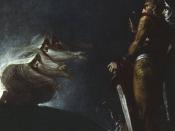Act II. Scene III. -
Donalbain: "There's daggers in men's smiles: the near in blood, / The nearer bloody."
Macduff and Lennox, the source of the knocking in the last scene, arrive at Macbeth's castle. News of King Duncan's death reaches all at Macbeth's castle. Lady Macbeth faints and Macbeth in rage kills the two drunken guards after claiming that they obviously killed their King. These actions largely free Macbeth and Lady Macbeth from suspicion. King Duncan's sons, Malcolm and Donalbain are introduced, both men wisely deciding to flee Macbeth's castle as a precaution against their own murder. Malcolm will head for England, Donalbain for Ireland.
At the castle gates we hear knocking. The Porter attending the door exclaims that he is akin to the porter of hell and we soon learn that the earlier knocking was caused by the arrival of Macduff and Lennox, Macduff engaging the Porter in some insightful yet trivial banter (Lines 25-48).
Macduff and Lennox enter and are shortly greeted by Macbeth. Macduff asks of the King. Macbeth leads Macduff to the King's chambers.
Shortly afterwards, we hear from Macduff, "O horror! horror! horror! Tongue nor heart / Cannot conceive nor name thee!" (Line 70).
Macbeth asks what the problem is, and feigning surprise incredulously asks if the King's life is what he speaks of. Macbeth and Lennox awaken the rest of the castle.
Lady Macbeth asks what's going on, Banquo tells Lady Macbeth who later feints.
Macbeth says that had he died before this deed, he would have "liv'd [lived] a blessed time; for, from this instant, / There's nothing serious in mortality," (Lines 99-100).
Malcolm and Donalbain hear of their father's death from Banquo and Macbeth exclaims that he killed the two bridegrooms in his fury.
The two brothers wisely conclude...


